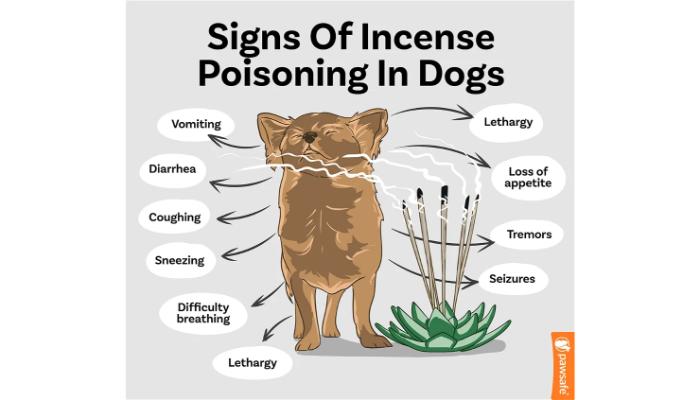You might think a little incense is harmless, but when it comes to your dog’s well-being, caution’s key. Dogs have incredibly sensitive noses, and what’s a soothing scent to you could be overwhelming for them.
This article delves into the potential health risks incense poses to your furry friend, explores safer alternatives, and shares expert insights.
Let’s ensure your desire for ambiance doesn’t inadvertently compromise your dog’s health.
Understanding Dogs’ Sensitive Noses:

In considering the safety of burning incense around your pet, it’s crucial to recognize that dogs can react differently to scents compared to humans. Their olfactory system is highly developed, making them susceptible to olfactory overload when exposed to strong fragrances. This sensory bombardment can lead to discomfort or even stress.
Moreover, dogs rely on their sense of smell for communication through scent marking. Introducing foreign scents via incense can disrupt this form of communication, potentially causing confusion or anxiety.
It’s important to be cautious and observe your dog’s behavior when burning incense, as their reaction can serve as an indicator of their comfort or distress with the altered olfactory environment.
How Incense May Impact Canine Health?
Beyond the discomfort of strong scents, burning incense around your dog can pose serious health risks, from respiratory issues to potential toxicity. The smoke from incense often contains particulate matter that can cause respiratory distress in dogs. Additionally, certain incense may release toxic compounds that are hazardous to your pet’s health.
| Health Issue | Description |
|---|---|
| Respiratory Distress | Difficulty in breathing due to smoke inhalation |
| Allergic Reactions | Sneezing and itching from scent sensitivity |
| Toxicity | Ingestion or inhalation of harmful substances |
| Eye Irritation | Watery, red eyes from smoke exposure |
It’s imperative to be cautious when using incense if you have a canine companion. Prioritize well-ventilated areas and monitor your dog for any signs of distress or adverse reactions.
Choosing Dog-Friendly Alternatives to Incense:
Why not explore pet-friendly alternatives that’ll keep your home smelling fresh without risking your dog’s health? It’s essential to consider the safety and well-being of your furry friend when selecting home fragrances. Aromatic herbs and certain essential oils can be used cautiously to create a pleasant environment without the potential hazards associated with incense smoke.
Here are safer options to consider:
- Pet-safe essential oil diffusers: Utilize diluted oils known to be non-toxic to dogs.
- Fragrance-free air purifiers: Capture odors without emitting harmful substances.
- Natural potpourri: Choose non-toxic, dried plant materials.
- DIY baking soda deodorizers: Place in strategic areas to absorb odors.
Always consult with a veterinarian before introducing new scents to ensure they’re safe for your dog.
Tips for Preventing Incense-Related Issues in Dogs:

To protect your dog from incense-related issues, you’ll want to take proactive steps in managing your home’s air quality.
Be conscious of the incense ingredients you choose; opt for natural options free from harmful chemicals and synthetic fragrances that can aggravate your dog’s respiratory system.
It’s crucial to ensure adequate ventilation in the area where incense is burned. Implement ventilation solutions such as opening windows or using an air purifier to dilute and remove airborne particles. This reduces the concentration of potentially irritating or toxic substances in the environment.
Always monitor your dog’s response to incense. If you observe any signs of discomfort or respiratory distress, cease incense use immediately and consult your veterinarian.
Your furry friend’s health is paramount.
Expert Opinions on Incense Safety:
You’ll find that many veterinarians and animal health experts express caution when it comes to using incense around dogs due to the potential risks to their respiratory health. The scientific community highlights several concerns:
- Incense Ingredients: Some may be toxic when inhaled, causing inflammation or allergic reactions in dogs.
- Ventilation Importance: Proper airflow is crucial to dissipate smoke and reduce the concentration of irritants.
- Sensitivity Variations: Dogs have diverse sensitivity levels; what’s benign to one might be harmful to another.
- Long-Term Exposure: Chronic exposure to incense smoke could potentially lead to respiratory issues over time.
When considering incense use, it’s essential to weigh these factors carefully and consult with a veterinarian to safeguard your dog’s health.
Frequently Asked Questions:
Certain breeds with scent sensitivity may exhibit more allergic reactions to incense due to breed predispositions. It’s crucial you research and consult a vet regarding your dog’s specific tolerance and potential risks.
Burning incense frequently and for prolonged periods can harm your dog’s health. Prioritize ventilation importance and consider incense alternatives to ensure their wellbeing. Always observe your pet for any adverse reactions carefully.
You should monitor for coughing, wheezing, or behavioral changes, which may signal incense toxicity. If you notice these signs, it’s crucial to improve your dog’s air quality and consult a veterinarian promptly.
Regular exposure to strong scents may dull your dog’s olfactory capabilities, potentially affecting smell training. It’s crucial to implement ventilation solutions to mitigate any long-term impacts on their highly sensitive sense of smell.
If your dog’s been exposed to incense, seeking veterinary consultation is crucial. They can recommend detox methods and incense alternatives to prevent further side effects, ensuring a safer environment for your pet’s health.
Conclusion:
In the tapestry of your home, incense threads may seem fragrant, but for your canine companion, they can weave a different story. Your dog’s acute olfactory landscape is delicate, and incense smoke can be an abrasive intruder.
Embrace safer scents to ensure your pet’s health isn’t compromised. Let the air be a clean canvas, where your dog’s well-being paints the picture. Experts’ cautious brushstrokes recommend this mindful approach for a harmonious living space.

Hey there, I’m Janet Brooks, a dog-loving student from California. I’m all about helping pups in need, especially those without homes. Me and my awesome friends work together to give shelter and love to stray dogs. Oh, and I also write blogs about dogs to share helpful info.